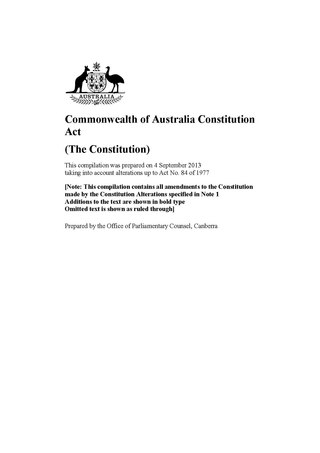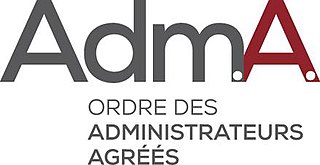
A stockbroker is an individual or company that buys and sells stocks and other investments for a financial market participant in return for a commission, markup, or fee. In most countries they are regulated as a broker or broker-dealer and may need to hold a relevant license and may be a member of a stock exchange. They generally act as a financial advisor and investment manager. In this case they may also be licensed as a financial adviser such as a registered investment adviser.

The Canadian Securities Institute is a Canadian organization that offers licensing courses, advanced certifications, continuing education and custom training for financial services professionals in Canada and internationally.
An independent financial advisers (IFA) is a professional who offers independent advice on financial matters to their clients and recommends suitable financial products from the whole of the market. The term was developed to reflect a United Kingdom (UK) regulatory position and has a specific UK meaning, although it has been adopted in other parts of the world, such as Hong Kong.
The Certified Financial Planner certification is a professional certification mark for financial planners conferred by the Certified Financial Planner Board of Standards in the United States, and by 25 other organizations affiliated with the Financial Planning Standards Board (FPSB), the owner of the CFP mark outside of the United States. The certification is generally considered the gold standard in the financial planning industry. The certification is managed by the Certified Financial Planner Board of Standards, Inc., which was founded in 1985 as a 501(c)(3) non-profit organization; it is neither a government designation nor an accredited degree.

A financial adviser or financial advisor is a professional who provides financial services to clients based on their financial situation. In many countries, financial advisors must complete specific training and be registered with a regulatory body in order to provide advice.
The financial management advisor (FMA) is a professional designation of the Canadian Securities Institute (CSI), the official educator of the Canadian securities industry. The FMA is a personal financial planning designation which is usually a precursor to the certified financial planner (CFP) designation. There are over three thousand FMA holders in Canada. The FMA designation is not recognized in the province of Quebec.
Regulatory Guide 146 on Training of financial product advisers, formerly known as policy statement 146 is an Australian financial regulation issued by the Australian Securities & Investments Commission (ASIC) related to the minimum training required by individuals selling financial products. When used in the context of describing an individual it means that such an individual has completed relevant training and passed an exam recognised as meeting RG 146 criteria and is then able to provide advice on financial products to the general public in Australia.
Following is a partial list of professional certifications in financial services, with an overview of the educational and continuing requirements for each; see Professional certification § Accountancy, auditing and finance and Category:Professional certification in finance for all articles.
Advocis, The Financial Advisors Association of Canada (TFAAC) is the largest voluntary professional membership association of financial advisors in Canada, representing more than 13,000 members and 40 chapters across the country.

Australian Financial Services Licence (AFSL) is a legal licence provided by the Australian Securities and Investments Commission (ASIC) enabling the operation and activities of Australian financial services businesses. It is a legal requirement for any Australian financial service business to obtain an AFSL from the day business operations begin unless provided a limited licence or exemption with special provisions under section 911A(2)(l) of the Corporations Act. The AFSL is issued by ASIC under Chapter 7 of the Corporations Act 2001, in line with its regulatory supervision of the financial services industry. Australian Financial Service Businesses must submit an application to ASIC coupled with supporting documents to be assessed. Licensees are obligated to provide efficient, honest and fair financial services under the conditions of their AFSL and the Corporations Act 2001. Failure to follow and uphold the policies under the AFSL and the Corporations Act 2001 will result in penalties against the business.

Storm Financial Limited was a financial advice company, based in Townsville, Queensland, Australia. The company was founded by Emmanuel Cassimatis and his wife Julie Cassimatis as a private company initially with the name Cassimatis Securities Pty Ltd on 23 May 1994. As part of the company's expansion outside of Townsville the company changed its name from a personality based name to ozdaq Securities Pty Ltd on 10 April 2000. This name remained intact until 1 February 2004 when it was relinquished consequent to trademark objections from the Nasdaq stock exchange in the United States. The company then traded as Storm Financial Pty Ltd from 2 February 2004 until 14 June 2007 at which time the company became an unlisted public company and continued trading as Storm Financial Ltd from 15 June 2007 in preparation for making an initial public offering (IPO) in December 2007. This IPO was subject to a Storm Financial Prospectus which was dated 14 November 2007 and lodged with the Australian Securities & Investments Commission (ASIC) on the same date. Storm Financial Ltd continued to trade until external administrator Worrells Solvency and Forensic Accountants were appointed on 9 January 2009. The main creditor Commonwealth Bank appointed receivers and manager KordaMentha on 15 January 2009.
The Autorité des marchés financiers is a self-funding government agency responsible for financial regulation in the Canadian province of Quebec. It regulates the province's financial markets and provides assistance to consumers of financial products and services. As provided for under its incorporating legislation, the AMF's mission is to enforce the laws governing the regulation of the financial sector, notably in the areas of insurance, securities, deposit institutions and the distribution of financial products and services.

Robo-advisors or robo-advisers are financial advisers that provide personalized financial advice and investment management online with moderate to minimal human intervention. A robo-advisor provides digital financial advice based on mathematical rules or algorithms. These algorithms are designed by human financial advisors, investment managers and data scientists, and coded in software by programmers. These algorithms are executed by software and do not require a human advisor to impart financial advice to a client. The software utilizes its algorithms to automatically allocate, manage and optimize clients' assets for either short-run or long-run investment.

The Ordre des administrateurs agréés du Québec (Adm.A.) is a professional Order mandated by the Government of Quebec (Canada) to regulate the practice of the "Administrateurs agréés".
The Institute of Financial Planning is the only organization in Quebec (Canada) authorized to grant the financial planning diploma which leads to the Financial Planner (F.Pl.) title.
The Chambre de la sécurité financière is the self-regulatory organization for representatives subject to Autorité des marchés financiers (Québec) distributing financial products and services, and Financial Planners of Quebec (Canada).
The Bureau des services financiers (BSF) was an organization in the Canadian province of Quebec responsible for the distribution of financial products and services covering the various disciplines defined by the "Act on the distribution of financial products and services": Insurance of persons, group insurance of persons, damage insurance, claims adjudication, financial planning, mutual fund brokerage, brokerage in investment contracts and brokerage in stock exchange plans studies. The BSF was in operation from 1998 to 2004, when its mission was absorbed under the Autorité des marchés financiers (Quebec).

The Financial Planning Association of Australia (FPA) is "Australia’s leading professional association for financial planners." The association has around 11,000 members and affiliates, with nearly 5,000 CERTIFIED FINANCIAL PLANNER® (CFP) professionals. The FPA offers different membership categories including CFP® Professional, Practitioner member - AFP®, Affiliate, Retired, Academic and Student Affiliate members. In addition to running a program of local events across Australia, the FPA also hosts an annual professionals Congress for members and non-members in the profession. The FPA operates 30 Chapters across Australia which are supported by Chapter Chairs and Regional Chapter Chairs. The Future2 Foundation is the charitable enterprise of the FPA, and funds are raised through a mixture of activities including networking and social events. Alongside its consumer-facing brand Money & Life the FPA also runs regular campaigns to raise awareness of the value of financial advice amongst Australian consumers.
A Chartered Administrator is a member of the Ordre des Administrateurs Agréés du Québec who may use the abbreviation "Adm.A." in French or "C.Adm." in English.
Chartered Financial Divorce Specialist (CFDS) is a Canadian professional designation that can be earned by eligible individuals holding a recognized financial designation and have completed specific training in the financial aspects of life transitions with respect to collaborative (mediated) cohabitation, marriage agreements, relationships or marital breakdowns. It is based on professional best practice standards and a code of professional ethics, granted and monitored by the Academy of Financial Divorce Specialists in Ontario, Canada and other relevant licensing authorities.









